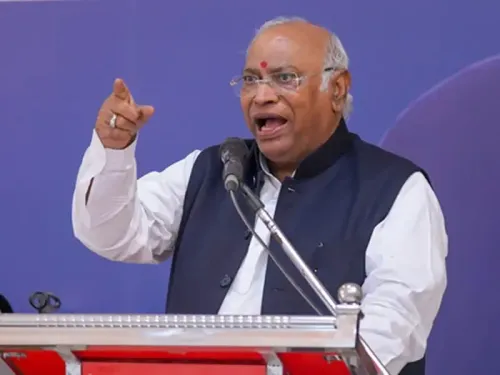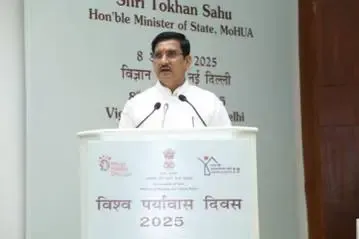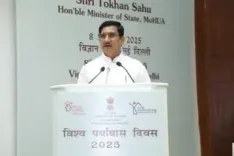Is Plastic Now Banned at Varanasi's Kashi Vishwanath Temple?

Synopsis
Key Takeaways
- Plastic is banned in Kashi Vishwanath Temple to promote sustainability.
- A 10-day awareness campaign preceded the ban.
- Bamboo baskets and metal pots are now used instead of plastic.
- The initiative aims to maintain the sanctity of the temple.
- Collaboration with local authorities ensures compliance.
Varanasi, Aug 11 (NationPress) In a significant move, the use of plastic has been entirely prohibited in the renowned Kashi Vishwanath Temple as of Monday. The temple authorities had embarked on a comprehensive 10-day awareness campaign prior to the ban, utilizing various digital, electronic, and print media to inform both devotees and vendors at key locations within the temple vicinity, including Godaulia and Maidagin.
To facilitate this transition, the administration provided bamboo baskets and metal pots to prasad shops, promoting environmentally friendly alternatives. This initiative has been met with enthusiasm from devotees and local shopkeepers alike, who believe it will aid in maintaining the sanctity and cleanliness of this sacred site.
In a statement to IANS, Vishwa Bhushan Mishra, the Chief Executive Officer of Kashi Vishwanath Temple, remarked, "We announced this decision in 2024. People were informed about the importance of using bamboo baskets and other eco-friendly materials. As of today, the ban is effective, and entry with plastic is prohibited."
Rajkumar Seth, a local shopkeeper, commended the initiative, saying, "This is a commendable step by the temple administration. I am grateful for this effort. It will undoubtedly benefit the environment. We will now switch to steel and paper instead of plastic."
Another devotee, Pradeep Singh, reflected, "The ban on plastic is a positive development. I urge everyone to opt for paper."
Aditya, yet another devotee, added, "This is a fantastic initiative. It will contribute positively to the environment, and I extend my gratitude to the temple administration for this."
The distribution of bamboo baskets and steel pots marks a pivotal milestone in the "Plastic Free Dham" campaign. This public awareness initiative, which commenced on July 12, aims to safeguard the environment and uphold the cleanliness around the temple.
Initially announced in December 2024, the ban aims to diminish pollution and foster sustainable practices among both devotees and vendors. All forms of plastic, including wrappers, carry bags, and packaging for offerings such as fruits and flowers, are strictly prohibited. Even thin plastic films and polythene sheets commonly used for religious items will not be allowed.
This initiative is part of the broader environmental commitment of the Kashi Vishwanath Temple Trust, aligning with the Uttar Pradesh government's efforts to promote sustainability at major pilgrimage sites.
To ensure compliance with the new regulations, temple authorities have collaborated with local municipal agencies to establish checkpoints and deploy volunteers who will assist devotees. Vendors are also being educated and provided with alternatives to plastic.
The Kashi Vishwanath Temple, one of the most revered shrines in Hinduism, attracts thousands of devotees daily. This ban is anticipated to greatly reduce the temple's plastic waste and set a precedent for other religious institutions across India.









